The rapid growth of coastal destinations, the extraction of lithium from clay, the death of a well-known historian and a mayor’s encounter with an organized crime figure were among the issues President López Obrador discussed at his morning press conferences, or mañaneras, in the first workweek of July.
AMLO even acknowledged the launch of Meta’s new Twitter-like social media app, Threads, and — in case reporters missed it — read aloud his very first post, in which he offered some free advice to Mark Zuckerberg.
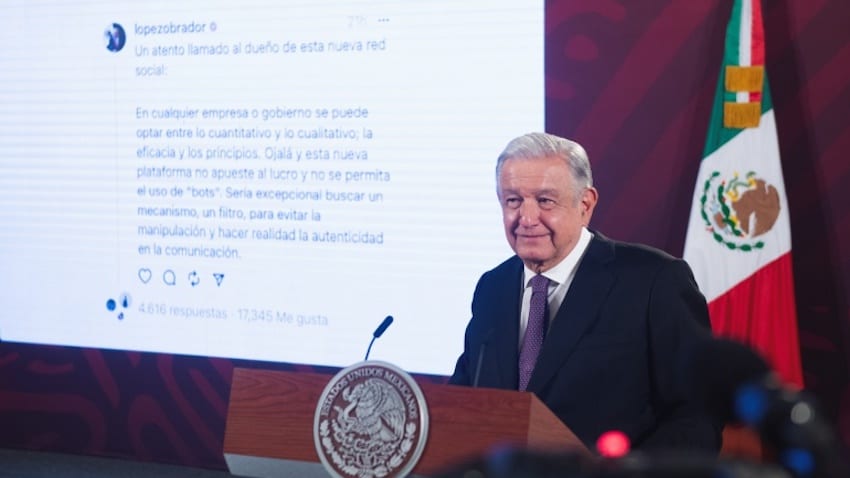
Monday
“There is now a Maya Train,” the General Director of the National Tourism Promotion Fund (Fonatur) Javier May said during the government’s weekly update on the 1,500-kilometer-long railroad currently under construction in the states of Tabasco, Campeche, Yucatán, Quintana Roo and Chiapas.
“The first four-car train left the Alstom plant in Ciudad Sahagún, in the state of Hidalgo, a moment ago. It’s on its way to the workshop … in Cancún. It will arrive July 8 for assembly and the beginning of static tests and then, in the middle of August, it will begin running on tracks between Cancún and Mérida for dynamic testing,” May said.
“This first train, as is the case with the other trains, was made in Mexico with the best technology and the highest standards of quality and safety. It’s a comfortable, modern and safe train,” he said.
“… The first train is on its way, and the transformation of the southeast is underway. … We’re also going to fulfill our commitment to inaugurate the Maya Train in the month of December because in the fourth transformation, commitments are fulfilled,” said May, who assumed responsibility for the multibillion-dollar rail project when he took the reins of Fonatur in January 2022.
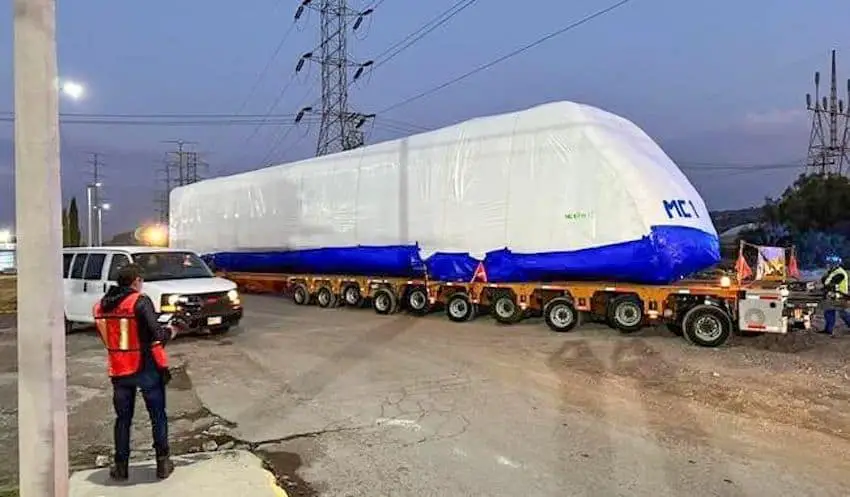
Early in his Q&A session with reporters, AMLO asserted that his government is committed to sustainable development in coastal areas that have grown rapidly in recent years.
“In tourism destinations, in beach areas like Puerto Escondido, even Huatulco and also on the Caribbean [coast], in Tulum, [there are] a lot of abuses, invasions, not just by people looking for a place to live but also by tycoons who buy thousands of hectares from ejidatarios [communal land owners],” the president said.
López Obrador said that the federal government is “putting things in order” in such places and will have drawn up urban development plans for each of them before his six-year term ends in late 2024.
“… In the Riviera Maya, there wasn’t a development plan [although] there was originally [one] for Cancún. For example, buildings over a certain number of floors couldn’t be built, and there was order. Now that [rule] has resumed, and developers have to leave sufficient green areas [on properties]. The same thing will happen in all the municipalities that the Maya Train passes through, because there is going to be a lot of population growth and tourism,” he said.
Later in his press conference, AMLO claimed that opposition parties are “splitting up” because they have been taken over by a “grouping” — presumably the recently announced Broad Front for Mexico — led by businessman Claudio X. González, son of a magnate of the same name.
Institutional Revolutionary Party members and leaders are quitting because they have realized the party has been “absorbed, swallowed” by the “supreme conservative power, whose manager is Claudio X. González’s hijo,” López Obrador said.
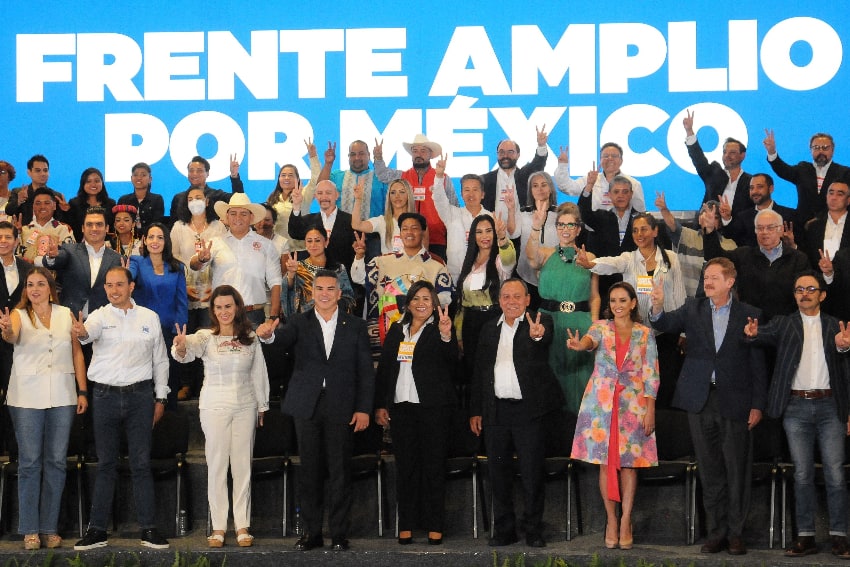
AMLO also claimed that Senator Xóchitl Gálvez has already been chosen as the 2024 presidential candidate for the main opposition parties’ coalition, even though the PAN-PRI-PRD bloc’s official selection process for a candidate won’t conclude until September.
A “process of consultation” led by González was carried out in which “those who don’t show their faces” were asked who should represent the right-leaning Broad Front — which includes the three-party opposition coalition — in the June 2, 2024, election, the president alleged.
“I have all the information [to confirm] that consultations were carried out so that Xóchitl Gálvez [would] represent this group. … [The participants were] those who provide money for the campaigns, for the dirty war, … the owners of media outlets, … the intellectuals,” López Obrador said.
“… And why decide in favor of Xóchitl?” the president continued. “Because they assume that if she was born in a pueblo [town], she’ll have the support of the pueblo [people].”
However, Gálvez, an indigenous Otomí woman born into a family of modest means in Tepatepec, Hidalgo, is “not of the people” but rather “part of the conservatives,” AMLO asserted.
Among other remarks, the president said he was very happy that 16 police employees abducted in Chiapas last week had been released, and expressed his opposition to the new immigration law that recently took effect in Florida.
“Not one vote for [Governor Ron] DeSantis. … Not one vote for those who reject migrants. We can’t remain silent,” he pleaded U.S. voters.
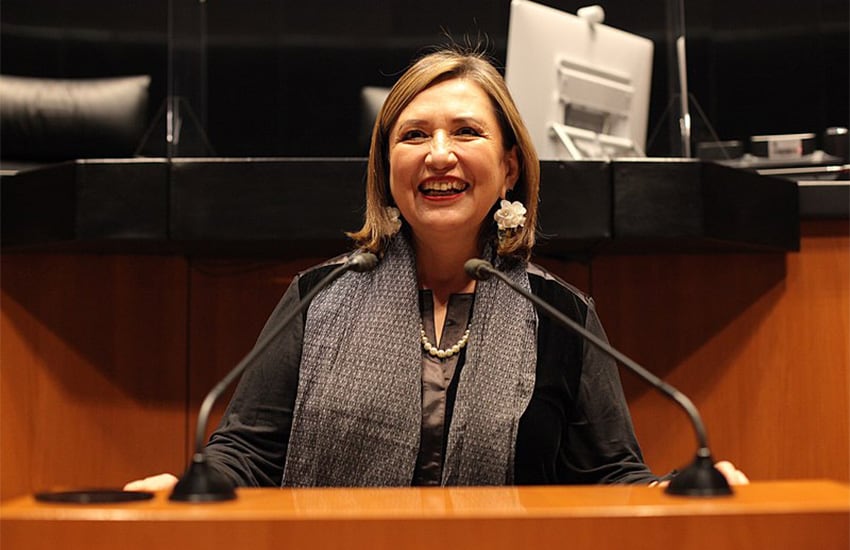
Tuesday
“That made me mad,” AMLO said when a reporter noted that Senator Xóchitl Gálvez called him “sexist,” after he claimed she had been chosen as the presidential candidate for the Broad Front for Mexico.
The reporter also noted that the senator asserted that the president can’t imagine a woman becoming a candidate by her own merits.
“I respect her point of view,” López Obrador said.
“I explained yesterday that she is the candidate of the mafia of power. She’s the candidate of [ex-presidents] Salinas … [and] Fox; she’s the candidate of Claudio X. González and other influence peddlers. She’s the candidate of those who want to return for their fueros [legal immunity for politicians] because they want to continue looting the country,” he said.
López Obrador was also probed about the Supreme Court’s assertion, in response to an inquiry from the government, that the salaries of the 11 justices of the Court, in accordance with one article of the constitution, cannot be lowered — even though another article of the same constitution states that no public servant, under usual circumstances, can make more money than the president earns.
“A pettifogging response like that was to be expected,” AMLO said before asserting that Article 127 of the Mexican Constitution is “very clear” and that the Supreme Court justices are violating it.
“There can be exceptions … [that allow public servants] to earn more than the president, but only 50% more,” said the president, who has previously pointed out that the salaries of the Supreme Court justices are four times higher than his own.
When asked later in his press conference about when the government planned to offer additional COVID-19 vaccines to citizens, López Obrador called on Deputy Health Minister and coronavirus czar Hugo López-Gatell to respond.
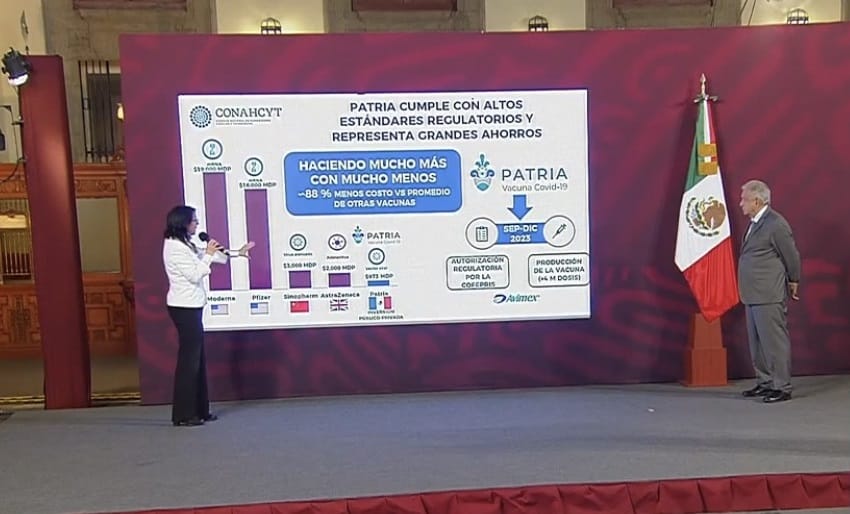
The government’s “preference” is to offer additional COVID-19 vaccines to senior citizens and adults with chronic diseases in October at the same time that flu shots are administered, López-Gatell said.
Back behind the mañanera lectern, AMLO noted that the National Council of Humanities, Science and Technology (Conahcyt) created a new ventilator model during the pandemic, as well as a COVID-19 vaccine.
“And now it is doing very important work to substitute agrochemicals [such as the soon-to-be banned herbicide glyphosate],” he said of the council, whose acronym recently changed from Conacyt due to the addition of “humanities” to its name.
“And [the council] has started working on how to separate clay from lithium, … which is a technology that only the Chinese have. [Conahcyt chief] María Elena [Álvarez-Buylla] informed me that they’ve made 95% progress, that the separation of lithium from clay can be achieved. A major breakthrough. This will mean a lot for Sonora,” López Obrador said, referring to the state with Mexico’s largest lithium reserves.
Lithium, which was nationalized last year, “belongs to the nation, and is a strategic mineral for batteries,” he added.
Wednesday
AMLO acknowledged the death of historian Adolfo Gilly at the beginning of his press conference.
“He has a book that is essential to understanding the Mexican revolutionary process, it’s called La revolución interrumpida. Young people should read this book,” López Obrador said.
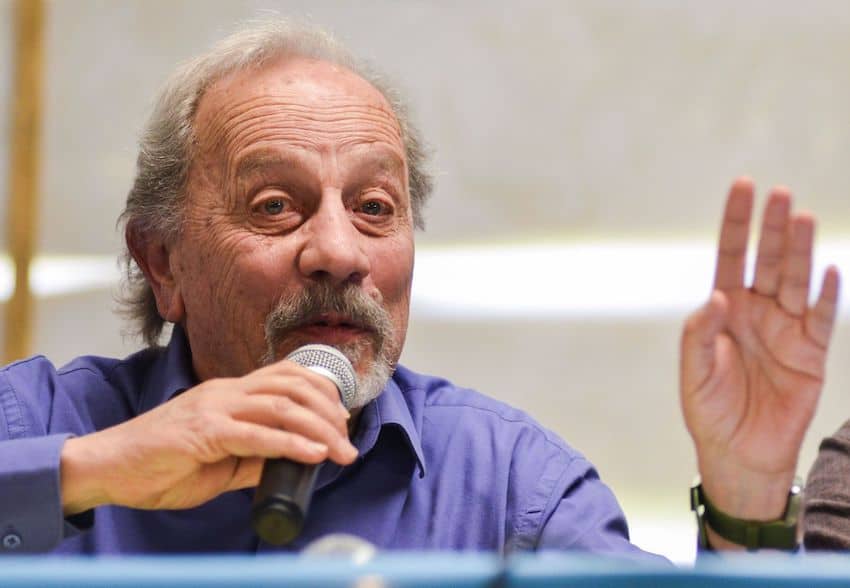
“… A hug to his relatives, to the friends of Gilly. He was here with us about a year ago, he came here to the [National] Palace, he brought me his book about [the revolution-era general] Felipe Ángeles, which is a great book as well.”
Later in the mañanera, a reporter notified López Obrador that José Ángel Gurría, a former secretary-general of the Organization for Economic Co-operation and Development and a cabinet minister in the 1994–2000 government of former president Ernesto Zedillo, wouldn’t take part in the contest to become the Broad Front for Mexico’s presidential candidate.
AMLO indicated he wasn’t surprised by the news before expressing doubt that Gurría would be able to collect 150,000 signatures of support, the number required for opposition bloc aspirants to advance to the second stage of the selection process.
“He thought he was going to be the chosen one, but those who are in charge — who bought the PRI and the PAN some time ago — were the ones who decided,” López Obrador said.
“… Who the oligarchs chose is the señora Xóchitl [Gálvez], and the media campaign has already started,” he said.
Responding to a question about the government’s plan to launch a state-owned commercial airline, AMLO reaffirmed that the carrier will begin flying before the end of the year.
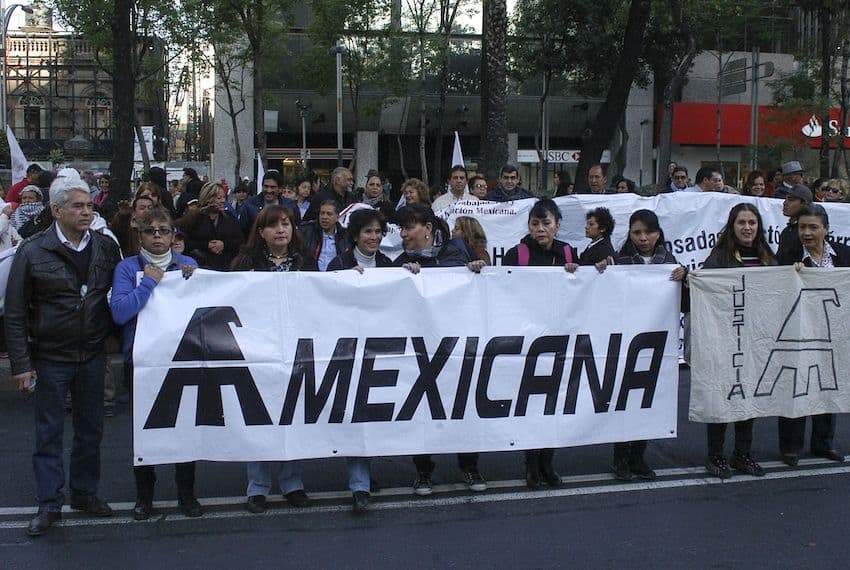
“The new planes of the airline will begin to fly in December,” he said.
The government reportedly reached a deal in January to buy the brand and some assets of defunct airline Mexicana de Aviación for more than 800 million pesos, but López Obrador acknowledged there are legal difficulties with the planned purchase and asserted that completing it would be “very difficult.”
He subsequently said that the government didn’t want to “buy a lawsuit,” in buying the airline, effectively ruling out the purchase of the Mexicana name. López Obrador described the situation as “regrettable.”
The president’s mood lightened when he was informed that the value of the U.S. dollar had dipped below 17 pesos. He instructed his team to display the exchange rate on the screen behind him and asserted that the appreciation of the peso during his term in office is something that “hadn’t happened in decades.”
AMLO declined to make a prediction about whether the peso would continue to strengthen but declared that he was “very happy” with the current exchange rate.
“It helps us. We have a percentage of public debt contracted in dollars. So, when the peso strengthens, our debt goes down,” López Obrador said.
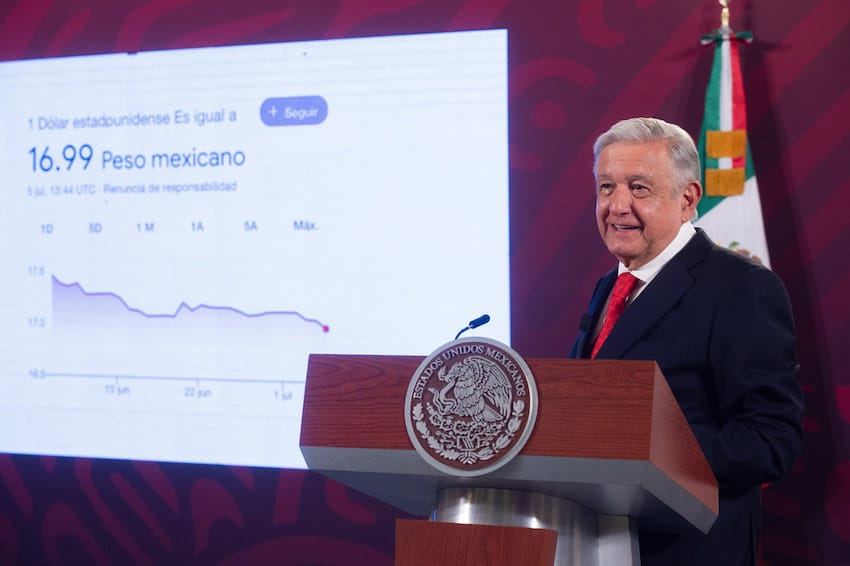
Thursday
“There were no homicides in half of the [32] states yesterday,” López Obrador said early in his press conference.
“Why am I saying this? … Because yesterday, the Televisa [broadcasters] dedicated all of their airtime to speaking about violence in Mexico,” he said.
“… [In] 16 states — half of the states in other words — … there was not a single homicide [on Wednesday], but [people’s] perception might be different due to the politically driven sensationalism of media outlets,” López Obrador said.
The president’s remarks came after a reporter asked him about a murder of a man entering the Bellas Artes station of the Mexico City Metro on Wednesday night.
“The two people who committed this crime have already been arrested. … The motive is now known; it was robbery: 15,000 pesos,” AMLO said.
He later said that his government is “constantly” informed about what is happening in the entire country and takes actions to reduce the homicide rate, which declined by 1% in annual terms in the first five months of the year.
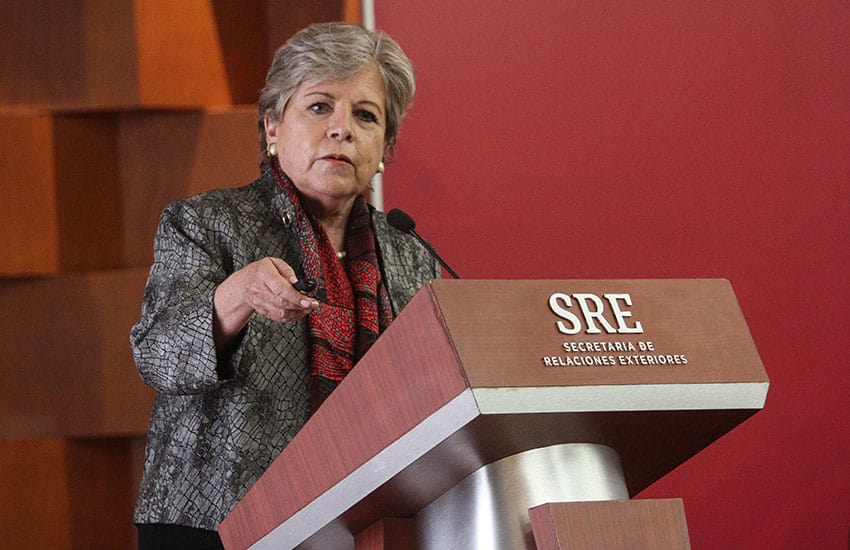
Questioned about his newly appointed foreign affairs minister, López Obrador described Alicia Bárcena as “one of Mexico’s best diplomats,” given her experience in the United Nations.
“There is not one formal complaint [about her] from the United States government, not one. Besides, and this is forgotten sometimes, Mexico is an independent, sovereign country. To appoint a minister of foreign affairs, Alicia Bárcena in this case, we don’t have to ask permission or see if they like it or not in Russia or China or the United States. No, these are our own sovereign decisions,” he said.
The government, with Bárcena, is working on the issues of migration and the trafficking of drugs and weapons, AMLO said.
“These are the issues. And due to the electoral season that … is already beginning in the United States, we have to be very aware of two issues in which they always want to involve Mexico: drugs and migration,” he said.
While he praised Bárcena for her experience at the UN, López Obrador took aim at the intergovernmental organization after a reporter noted that the UN had said in a report that Mexico is one of the world’s largest traffickers and producers of drugs.
“The UN is very stiff; it’s not doing its job; it’s not doing anything to combat the main problem in the world, which is inequality. They don’t do anything,” he said.
“… Also, they don’t do anything to avoid wars,” he added. “[The UN] is a beautiful building in New York with a lot of experts on everything. They earn a lot of money, they have all the specialties [covered], but they forget the foundations on which the United Nations was established.”
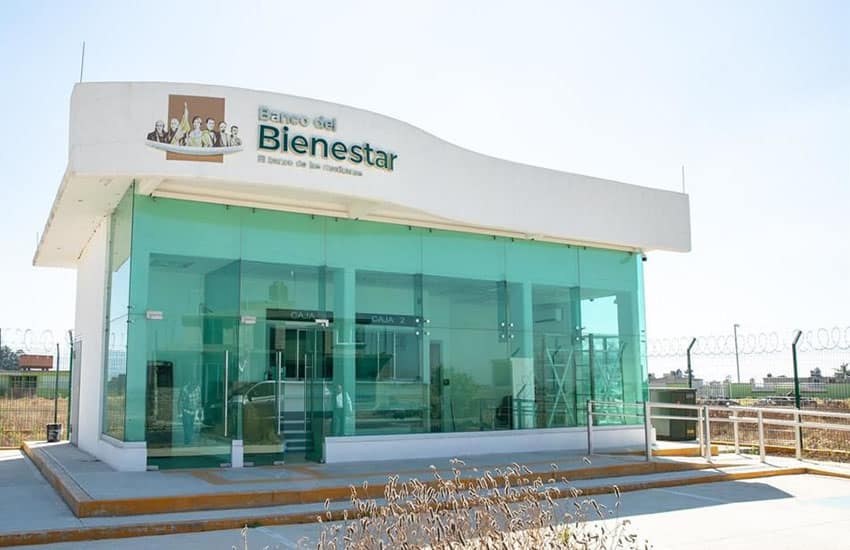
Turning to one of his favorite topics, the president told the press corps that 25 million Mexican families are benefiting from at least one of the government’s social programs, among which are the seniors pension program, scholarship schemes for students, employment programs and support schemes for farmers.
He estimated that five million additional families receive public money because their members include “public servants — whether they are teachers, doctors, nurses, officers of the National Guard, soldiers, marines [or] police.”
“The [government] budget reaches 30 million families or households of the 35 million that there are in the country,” López Obrador said.
The five million households that don’t receive government money are those with the highest incomes, he said. However, they, too, receive “special attention” because “there are no increases in the prices of gasoline and electricity, and there haven’t been tax increases,” AMLO added.
Among other remarks, the president highlighted “one of the advantages” of choosing to develop Mexico’s southeast, where the government’s projects include the Maya Train and the Isthmus of Tehuantepec trade corridor, along which billions of dollars in industrial investment is expected.
“Of all the [national] territory, the southeast has 70% of [Mexico’s] surface and subterranean water. … The Maya Train is going to cross the Usumacinta, which is the … most important river in Mexico,” he said.

Friday
“Good morning, cheer up, it’s already the weekend, Friday,” AMLO remarked at the top of his last mañanera of the week.
He noted that he had met on Thursday with governors of states that have signed on to the federal government’s new universal healthcare scheme, called IMSS-Bienestar.
Mexico has a mixed healthcare system, meaning healthcare is provided by both public and private institutions. In order to receive public healthcare, Mexicans must be registered as “salaried” employees of a formal employer. Informal employment in Mexico inhibits access to the public system.
“Almost half of [all] Mexicans don’t have social security, don’t have healthcare guaranteed, and for them … the IMSS-Bienestar health system is being built,” López Obrador said, adding that about half of Mexico’s states have signed on to the scheme.
“… In those states where the health system is currently being federalized, there are already general doctors, specialists, … the supply of medications is above 90%, there are new hospitals, upgraded hospitals, equipment that was needed,” he said.
“… We’ve made the commitment that, this year, we’re going to have one of the best public health systems in the world. People will be able to have medical attention 24 hours a day, seven days a week [as well as] the right to medicine, studies and surgical interventions with specialists free of charge. That’s what we’re building. And that’s why we met with these governors yesterday.”
López Obrador noted that he held a separate meeting with the governors of Chiapas, Tabasco, Campeche, Oaxaca and Veracruz, at which the issue of migration was discussed.
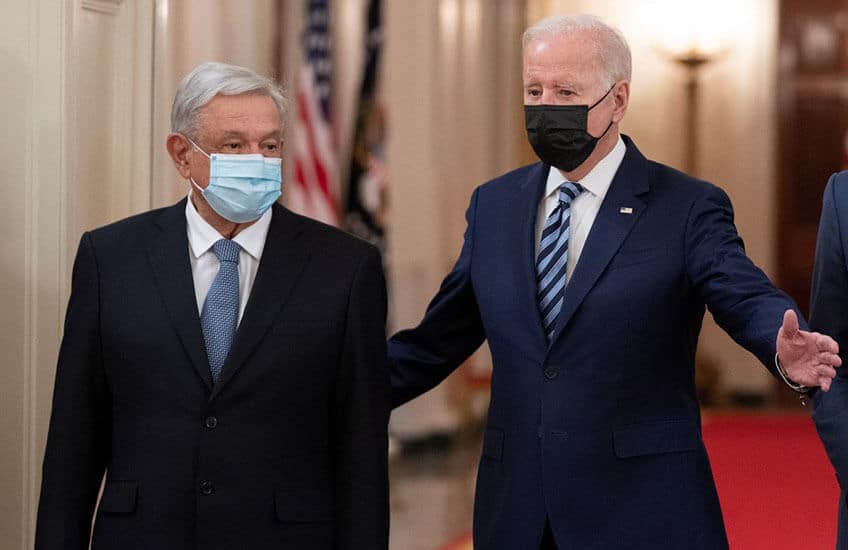
We’re doing quite well in everything related to migration. The aid programs for Central America and the Caribbean are being strengthened. … Mexico is one of the countries of the world that helps other people the most, even taking the great powers into account,” he said.
“… We’re investing close to US $200 million to support our Central American and Caribbean brothers, and other governments aren’t doing that,” AMLO said, adding that the Mexican government’s initiatives — among which are two employment schemes that have been implemented in Guatemala, Honduras and El Salvador — “have helped a lot to put order to the migratory flow.”
One reporter sought the president’s opinion on photographs that show the Morena Party Mayor of Chilpancingo, Guerrero — Norma Otilia Hernández — meeting the presumed leader of the Ardillos criminal gang.
“And a few hours ago, it was reported that the brother of the mayor of Chicoloapan, in México state, Nancy Gómez, was arrested for the possession of drugs and firearms,” the journalist added.
“Impunity is not permitted,” López Obrador responded. “And an investigation will be carried out, … we’ve already spoken with the governor of Guerrero.”
AMLO said he didn’t know whether the mayors would be forced to step down while investigations are conducted but asserted that there would be no “contamination” of the probes, even if they remained in their jobs.
Later in his presser, he asserted that the “transformation” of Mexico won’t end when he leaves office in late 2024. A president can’t be re-elected in Mexico, but “the transformation will continue,” López Obrador said.
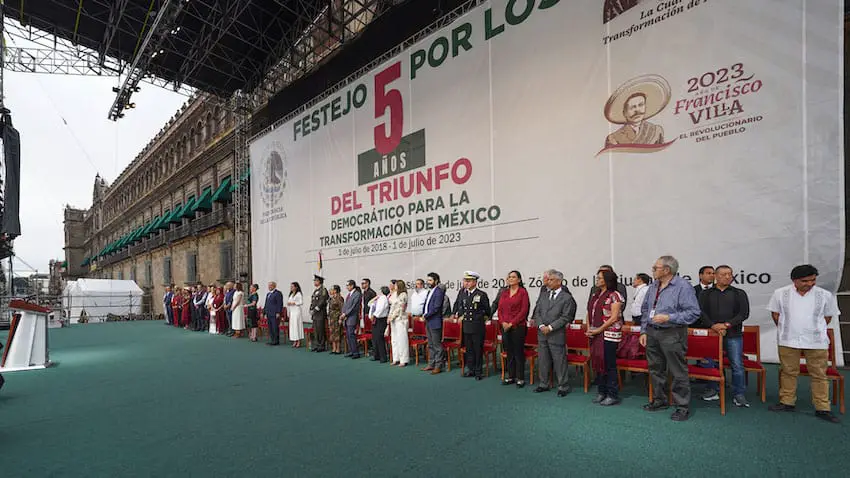
“The foundations [for the transformation] have been laid, and it will be very difficult for the same people who sank the country, who looted the country, to return,” he said.
“That’s why they’re so upset,” AMLO said, apparently referring to politicians who represent parties that previously held ruling power in Mexico.
He subsequently reaffirmed that he will completely withdraw from politics once his six-year term ends.
“I don’t want to be supreme leader [of Morena], or moral leader or caudillo or cacique [chief],” López Obrador said.
Demonstrating that he is up-to-date with happenings in the world of social media, the president — whose YouTube channel, according to the online analytics service Streams Chart, ranks as No. 5 in the Spanish-speaking world — took a moment toward the end of his press conference to speak about Threads, the Twitter rival launched by Mark Zuckerberg’s Meta this week.
“I already signed up and [wrote] my first message,” he told reporters.
“… A courteous appeal to the owner of this new social network,” AMLO continued, reading from his first post:
“In any company or government, you can choose between the quantitative or the qualitative, efficiency and principles. Hopefully, this platform won’t bet on profit and won’t allow the use of bots. It would be exceptional to seek a mechanism, a filter, to avoid manipulation and make authenticity in communication a reality,” said the “thread” sent out into the world by López Obrador, who enjoys (or endures) the support of many social media bots himself.
Shortly before he concluded his Friday mañanera, AMLO noted that there had been a fire on an offshore Pemex platform and declared that he wasn’t worried or afraid about the rise of Senator Xóchitl Gálvez ahead of the 2024 presidential election.
“I can openly tell you that the transformation movement is very strong, very very strong,” he said.
By Mexico News Daily chief staff writer Peter Davies (peter.davies@mexiconewsdaily.com)
